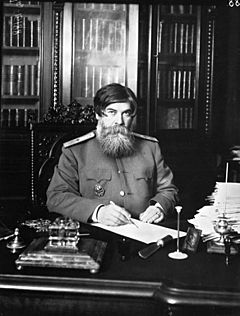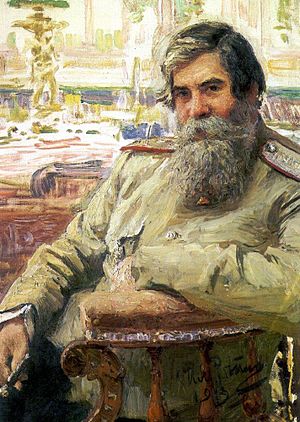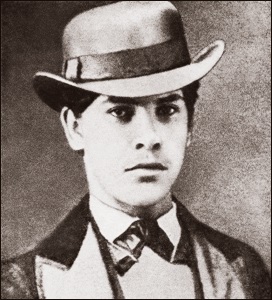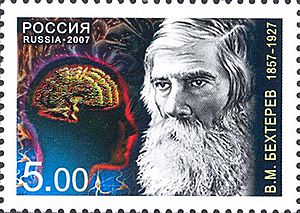Vladimir Bekhterev facts for kids
Quick facts for kids
Vladimir Mikhailovich Bekhterev
|
|
|---|---|
 |
|
| Born | 24 January 1857 Sorali, Vyatka Governorate, Russian Empire
|
| Died | 24 December 1927 (aged 70) |
| Nationality | Russian, Soviet |
| Alma mater | Saint Petersburg University |
| Known for | Bekhterev’s disease Bekhterev–Jacobsohn reflex Bekhterev's mixture |
| Scientific career | |
| Fields | Neurology, psychology |
| Institutions | Military Medical Academy |
| Doctoral advisor | Wilhelm Wundt |
| Doctoral students | Victor Pavlovich Protopopov |
| Influenced | Vladimir Nikolayevich Myasishchev |
Vladimir Mikhailovich Bekhterev (born January 20, 1857 – died December 24, 1927) was a famous Russian scientist. He was a neurologist, which means he studied the brain and nervous system. Many people call him the "father of objective psychology". This is a way of studying the mind by looking at what people do, not just what they think or feel.
Bekhterev is well-known for several important things. He discovered how a part of the brain called the hippocampus helps with memory. He also studied how our bodies react automatically to things, which are called reflexes. Another important discovery was a type of arthritis that affects the spine, now known as Bekhterev’s disease. He also had a friendly competition with another famous scientist, Ivan Pavlov, about how people and animals learn through "conditioned reflexes."
Some people believe that Vladimir Bekhterev died suddenly because of Joseph Stalin. Bekhterev had examined Stalin shortly before his death. The diagnosis he gave was thought to be harmful to Stalin's power. However, historians still debate this because there is no clear proof.
Contents
Early Life and Education
Vladimir Bekhterev was born in a small village called Sorali in the Russian Empire. This village was located between the Volga River and the Ural Mountains. His father was a police officer, and his mother was well-educated. Vladimir had two older brothers, Nikolai and Aleksandr.
When Vladimir was young, his family moved to Vyatka. Sadly, his father died from tuberculosis a year later. Even though his childhood was tough, Bekhterev was able to go to a good school in Vyatka in 1867. Later, in 1873, he attended the Military Medical Academy in St. Petersburg.
It was at the academy that Bekhterev became very interested in neuropathology (diseases of the nervous system) and psychiatry (mental health). In 1877, Russia went to war, and Bekhterev paused his studies to help as a volunteer. After the war, he returned to school and worked as a junior doctor. He started doing his own experiments there.
In 1878, Bekhterev graduated with a degree similar to a Bachelor of Medicine. He then worked at a psychiatric clinic in St. Petersburg. This job inspired him to study the brain's structure and how it works. This area later became where he made his biggest discoveries. Around this time, he also married Natalya Bazilevskaya.
Bekhterev began publishing his research in 1880. He wrote about social issues in Russia. In 1881, he earned his doctorate degree. This allowed him to become an associate professor, teaching about nervous system diseases.
Discoveries in Neurology

Throughout his life, Bekhterev did a lot of research that helped us understand the brain much better. He wrote books like The Conduction Paths in the Brain and Spinal Cord. In 1884, he published 58 scientific papers about how the brain works.
His hard work earned him a scholarship to travel and study in Germany and Paris for 18 months. He learned from many famous scientists there, including Wilhelm Wundt. After his trip, he returned to Russia in 1885. He became the head of the Psychiatry Department at the University of Kazan.
Brain Research and Bekhterev's Disease
While at the University of Kazan, Bekhterev made some of his most important discoveries. In 1886, he started Russia's first laboratory for experimental psychology. He used it to study the nervous system and brain structures.
Bekhterev believed that different parts of the brain have specific jobs. He also thought that problems with the nervous system and mental health issues often happen together. This meant he saw no clear line between them.
During his research, Bekhterev identified Ankylosing Spondylitis. This is a type of arthritis that causes pain and stiffness in the spine. It is now often called Bekhterev’s disease. Because of his amazing research, he was allowed to open and lead the Neurology Science Society in Kazan in 1891.
In 1893, Bekhterev moved back to St. Petersburg. He became the head of the Department of Nervous and Mental Diseases at the Military Medical Academy. There, he set up Russia's first operating room for brain surgery. Even though he didn't perform surgeries himself, he was very involved in diagnosing brain diseases. In 1894, he earned the high title of Full State Chancellor.
Publications and Recognition
Between 1894 and 1905, Bekhterev was extremely busy with his research. He wrote many scientific papers each year. He also started the first Russian journal about nervous diseases, called Nevrologicheski Vestnik (Neurology Bulletin), in 1893.
In 1900, he won the Baire’s Prize for his writings on the brain. In these works, he explained how the hippocampus part of the brain is important for memory. His other books included “Mind and Life” and “Foundations for Brain Functions Theory.” The latter described his ideas about how different brain parts and the nervous system work. He also suggested the Energetic Inhibition Theory, which explains how automatic responses (reflexes) happen.
Bekhterev published around 600 scientific papers in his lifetime. He also started other scientific journals. His research on how people learn automatic responses was very important. It became closely linked to a major area of psychology called Behaviorism. This work also led to his long-standing rivalry with Ivan Pavlov.
Objective Psychology
Bekhterev's idea of objective psychology says that we can understand all behavior by studying reflexes in a measurable way. This means looking at actions that can be seen and observed. This was different from older ideas in psychology that used methods like asking people about their inner thoughts.
Objective psychology later became the foundation for other important areas like Reflexology and behaviorism. Behaviorism changed how psychology was studied, making it more scientific. Bekhterev's ideas helped shape how psychology developed in Russia and beyond.
Other Contributions
Bekhterev founded the Psychoneurological Institute in St. Petersburg. In 1913, he had to leave his teaching job at the Military Medical Academy. But after the Russian Revolution of 1917, he was able to return in 1918. He became the head of the Department of Psychology and Reflexology at the University of Petrograd. He also created the Institute of Studying Brain Mental Activities.
In 1921, he helped organize the first conference on how to make work more efficient. He believed that the best way to organize work was to make it efficient, healthy, and help workers grow as people.
During his time away from teaching, Bekhterev opened an orphanage for children who had lost their homes. He also helped create health services in Russia.
Rivalry with Ivan Pavlov
Both Ivan Pavlov and Vladimir Bekhterev independently developed similar ideas about conditioned reflexes. These are automatic responses that people or animals learn to have to certain things in their environment. Bekhterev called his idea "association reflex," while Pavlov called it "conditioned reflex." Even though they used different names, their ideas were very similar.
John B. Watson, a famous American psychologist, used Pavlov’s research to develop his theory of Behaviorism. This made Pavlov very well-known. However, some people think that Bekhterev’s research actually fit Watson’s ideas even better.
Bekhterev knew about Pavlov’s work and had some criticisms. He thought Pavlov’s method of studying saliva in animals was not ideal because it was hard to use on humans. Bekhterev, on the other hand, used mild electrical stimulation to study motor reflexes. This allowed him to show that these reflexes existed in humans too.
Bekhterev also worried that using acid to make animals salivate might affect the experiment's results. He also felt that the saliva reflex was not always reliable. For example, if an animal wasn't hungry, food might not make it salivate, making the results unclear. Pavlov also had criticisms of Bekhterev, saying that Bekhterev’s laboratory was not well-controlled.
Death
The death of Vladimir Bekhterev is surrounded by mystery. In December 1927, he was a co-founder and honorary president of a big meeting of neurologists in Moscow. On December 23, 1927, after giving a lecture, Bekhterev went to the Kremlin to examine Joseph Stalin. About three hours later, he returned to the meeting and told some colleagues, "I have just examined a paranoiac with a short, dry hand."
The very next day, Bekhterev died suddenly. This led to rumors that Stalin had him poisoned as revenge for the diagnosis. Bekhterev was over 70 years old, but his health seemed fine in the months leading up to his death. After Bekhterev's death, Stalin had his name and all his works removed from Soviet textbooks.
Legacy
Vladimir Bekhterev made huge contributions to science, especially to psychology and neurology. He greatly increased our understanding of how the brain works and its different parts. For example, his research on the hippocampus helped us understand a key part of the brain important for memory.
His influence on psychology was immense. Bekhterev's ideas laid the foundation for the future of psychology. His thoughts on objective psychology and reflexes were a main part of behaviorism.
In 2015, a study included Bekhterev in a list of 53 famous Russian medical scientists. This list included doctors from different fields and time periods.
Only two know the mystery of brain: God and Bekhterev.
—Friedrich Wilhelm Theodor Kopsch
Key Discoveries
Bekhterev discovered and described many important things related to the brain and body:
- Bekhterev’s Acromial Reflex: A deep muscle reflex.
- Bekhterev’s Disease: A disease that causes inflammation and stiffness in the spine.
- Bekhterev’s Nucleus: An important part of the vestibular nerve in the brain.
- Bekhterev’s Nystagmus: Eye movements that happen after damage to the inner ear.
- Bekhterev’s Pectoralis Reflex: A reflex that extends the chest muscle.
- Bekhterev’s Reflex: He described three reflexes related to the eye, face, and stomach muscles.
- Bekhterev-Jacobsohn reflex: A finger bending reflex.
- Kaes-Bekhterev layer: A specific layer in the brain.
Other Accomplishments
- He published over 800 scientific papers and books.
- He developed Reflexology: The study of human behavior by looking at how the environment affects our actions.
- He created Bekhterev’s Mixture: A medicine that has a calming effect.
See also
 In Spanish: Vladímir Béjterev para niños
In Spanish: Vladímir Béjterev para niños
 | Audre Lorde |
 | John Berry Meachum |
 | Ferdinand Lee Barnett |



